Portuguese Classes
Portuguese Classes
The pronouns
Official forms:- eu – I
- tu – you (singular, very informal) This is used only in Portugal; Thou was once used as the informal you in English (found in Medieval and Renaissance English and earlier translations of the Bible)
- você = you (singular, informal) This form is used in Brazil.
- ele – he or it (For people and objects of the male gender)
- ela – she or it (For people and objects of the female gender)
- nós – we
- Vós – you (singular and plural, very formal) *
- eles – they (For male people and objects or both genders)
- elas – they (For female people and objects)
- Você – you (singular, formal), it was Vossa Mercê (Your
- A gente – we (singular, informal) (Just in Brazil) 2
- Vocês – you (plural) *2
- O senhor – he/sir (male, singular, formal) *3
- A senhora – she/madam (female, singular, formal) *3
- Os senhores – they (males, formal)
- As senhoras – they (females, formal)
|
Singular Portuguese
|
Singular English |
|
eu (m & f)
|
I |
|
tu (m & f)—limited use in Brazil
|
thou (you) |
|
ele (m)
|
he |
|
ela (f)
|
she |
|
você (m & f)
|
you |
|
o senhor (formal-m)
|
you |
|
a senhora (formal-f)
|
you |
|
a senhorita (formal-f—”Miss”)
|
you |
|
Plural Portuguese
|
Plural English |
|
nós (m & f)
|
we |
|
vós (m & f)—limited use in Brazil
|
ye (you) |
|
eles (m)
|
they |
|
elas (f)
|
they |
|
vocês (m & f)
|
they |
|
os senhores (formal-m)
|
they |
|
as senhoras (formal-f)
|
they |
|
as senhoritas (formal-f—”Misses”)
|
they |
| English | Portuguese | English | Portuguese |
| me (m/f) | me | (to) me (m/f) | me |
| you (familiar-m/f) | te | (to) you (m/f) | te |
| him/it (m) you (polite-m) | o | (to) him/it (m) (to) you (polite-m) | lhe |
| her/it (f) you (polite-f) | a | (to) her/it (f) (to) you (polite-f) | lhe |
| you (polite-m) | o senhor | (to) you (polite-m) | ao senhor |
| you (polite-f) | a senhora | (to) you (polite-f) | à senhora |
| you (familiar-m/f) | você | (to) you (familiar m/f) | a você |
| us (m/f) | nós/nos | (to) us (m/f) | nós/nos |
| you (formal familiar) | vós/vos (Portugal) | (to) you (formal familiar) | vós/vos (Portugal) |
| them (m) | os | (to) them (m/f) | lhes |
| you (polite-m) | os senhores | (to) you (polite-m) | os senhores |
| you (polite-f) | as senhoras | (to) you (polite-f) | às senhores |
| you (familiar m/f) | vocês | (to) you (familiar m/f) | a vocês |
Portuguese Phrasesa
| Bom dia. Boa tarde. Boa noite. Oi. Como vai? Olá, tudo bem? Como vai, tudo Bem? Aonde você vai? Qual é o seu nome? Você tem apelido? Pode me chamar de Bob. Qual é o seu sobrenome? Como se soletra? Vou te apresentar uns amigos… Essa é minha namorada. Você sabe o nome dela? Prazer em conhecê-la! O prazer é meu! Esse é o meu melhor amigo! Prazer em conhecê-lo. Como ele se chama? Você fala Português? Só um pouquinho. Estou aprendendo. Eu entendo mais do que falo. Estou começando a aprender… | Good morning. Good afternoon. Good evening. Hi. How are you? Hello, how are you? How are you doing? Where are you going? What’s your name? Do you have a nickname? You can call me Bob. What’s your last name? How do you spell? Let me introduce you to some friends… This is my girlfriend. Do you know her name? Nice to meet you! Nice to meet you, too! This is my best friend How do you do? What’s his name? Do you speak Portuguese? Just a little bit. I’m learning. I understand more than I speak. I’ve just started to learn it… |
| m-singular | f-singular | m-plural | f-plural | English |
| o meu | a minha | os meus | as minhas | my/mine (polite/formal) |
| meu | minha | meu | minhas | my/mine (informal) |
| o teu (p) | a tua | os teus | as tuas | your/yours (familiar singular) |
| o seu | a sua | os seus | as suas | his/her/hers/its/your/yours (polite/formal) |
| seu | sua | seus | suas | his/her/hers/its/your/yours (informal) |
| o nosso | a nossa | os nossos | as nossas | our/ours (polite/formal) |
| nosso | nossa | nossos | nossas | our/ours (informal) |
| a vosso (p) | a vossa | os vossos | as vossas | your/yours (formal familiar plural) |
| o seu | a sua | os seus | as suas | their/theirs/your/yours (polite/formal) |
| seu | sua | seus | suas | their/theirs/your/yours (informal) |
| a | to/at | ao (m) | à (f) | aos (m) | às (f) |
| de | of/from | do (m) | da (f) | dos (m) | das (f) |
| em | in/on | no (m) | na (f) | nos (m) | nas (f) |
| por++ | by/for | pelo (m) | pela (f) | pelos (m) | pelas (f) |
| de | of/from | dum (m) | duma (f) | duns (m) | dumas (f) |
| em | in/on | num (m) | numa (f) | nuns (m) | numas (f) |
|
antes de
|
before |
|
após
|
after |
|
depois de
|
after |
|
até
|
until/as far as |
|
desde
|
since |
|
através de
|
through/across |
|
sob
|
under |
|
sobre
|
over/on |
|
por cima de
|
over/above |
|
ao lado de
|
beside |
Basic Portuguese Phrases:
| Hello! / Good morning! | Bom dia! |
| Good afternoon! | Boa tarde! |
| Good evening! / Good night! | Boa noite! |
| Hi! / Bye! | Oi/Olá! Tchau! |
| Good bye. | Adeus. |
| Please. | Por favor. |
| See you / See you later. | Até mais. |
| See you later. | Até logo. |
| See you tomorrow. | Até amanhã. |
| Thank you (very much). | (Muito) Obrigado. (if a man is speaking) (Muito) Obrigada. (if a woman is speaking) |
| You’re welcome. / Don’t mention it. | Não há de quê. |
| Welcome | Bem-vindo |
| I’m sorry | Desculpe-me |
| Excuse me / Pardon | Com licença / Perdão. |
| Let’s go! | Vamos! |
| How are you? (formal; male) | Como o senhor está? |
| How are you? (informal) | Como vai? |
| How’s it going? (Only in Brazil) | E aí? |
| Well / Very well | Bem / Muito bem |
| Bad / Very bad / More or less | Mal / Muito mal / Mais ou menos |
| Yes / No | Sim / Não |
| What is your name? (formal; male) | Como o senhor se chama? |
| What is your name? (informal) | Qual é o seu nome? |
| My name is… | Me chamo… |
| Nice to meet you. | Prazer em conhecê-lo |
| Same here. | Igualmente. |
| Mister / Mrs. / Miss | Senhor / Senhora / Senhorita |
| Where are you from? (formal; male) | De onde o senhor é? |
| Where are you from? (informal) | De onde você é? |
| I’m from… | Eu sou de… |
| How old are you? (formal) | Quantos anos o senhor tem? |
| How old are you? (informal) | Quantos anos você tem? |
| I am _____ years old. | Eu tenho _____ anos. |
| Do you speak Portuguese? (formal) | O senhor fala português? |
| Do you speak English? (informal) | Você fala inglês? |
| I (don’t) speak… | (Não) Falo… |
| Do you understand? | Compreende? / Entende? |
| I (don’t) understand. | (Não) Compreendo. / (Não) Entendo. |
| I (don’t) know. | Eu (não) sei. |
| Can you help me? | Pode me ajudar? |
| Of course | Claro que sim |
| What? Pardon me? | Como? |
| Where is … / Where are … ? | Onde está / Onde estão… ? |
| Here. | Aqui |
| There is / are… / There was / were… | Há / Havia… |
| How do you say ___ in Portuguese? | Como se diz ____ em português? |
| What is that? | O que é isto? |
| What’s the matter (with you)? | Qual é o problema? |
| It doesn’t matter. | Não importa. |
| What’s happening? | O que aconteceu? |
| I have no idea. | Não tenho idéia. |
| I’m tired / sick. | Estou cansado / doente. |
| I’m hungry / thirsty. | Estou com fome / sêde. |
| I’m hot / cold. | Estou com calor / frio. |
| I’m bored. | Estou chateado. |
| I don’t care. | Não me importa. |
| Don’t worry | Não se preocupe. |
| That’s alright. | Tudo bem / ‘Tá bom. |
| I forgot. | Me esqueci. |
| I must go now. | Tenho que ir agora. |
| Bless you! | Saúde! |
| Congratulations! | Parabéns! |
| Good luck! | Boa sorte! |
| It’s your turn. (informal) | É a sua vez. |
| Shut up! | Cale-se! / Cala a boca! |
| I love you. (informal and singular) | Eu te amo. |
Meeting People in Portuguese
| De onde você é? Eu sou do Canadá. Eu sou francês. Onde você mora? Você é brasileiro? Eu sou dos Estados Unidos. Há quanto tempo você está no Brasil? Acabei de chegar. Cheguei semana passada. Chegamos já faz um mês! Onde você trabalha? Você trabalha em quê? Quantos anos você tem? Quando é o seu aniversário? Você é casado? Qual o nome da sua esposa? A senhora é casada? Qual o nome do seu marido? Vocês têm filhos? Temos um casal. Qual é a idade da sua filha? Você tem namorado? Você tem namorada? Quantos irmãos você tem? Qual é o seu telefone? Você quer dançar? Quer sair comigo essa noite? Vamos ao cinema? | Where are you from? I’m from Canada. I’m French. Where do you live? Are you Brazilian? I am from the US. How long have you been in Brazil? I’ve just arrived. I arrived last week. We arrived a month ago! Where do you work? What do you do? How old are you? When is your birthday? Are you married? What’s your wife’s name? Are you married? What’s your husband’s name? Do you have children? We’ve got a couple. How old is your daughter? Do you have a boyfriend? Do you have a girlfriend? How many siblings do you have? What’s your phone number? Would you like to dance? Would you like to go out tonight? Let’s go to the movies? |
Portuguese Question Words:
| what | o que* | which | qual (quais) |
| who | quem | how much | quanto (-a) (-s) |
| how | como | how many | quanto (-a) (-s) |
| when | quando | whom | a quem |
| where | onde | whose | de quem |
| why | por que* |
* The word que always receives the circumflex when it is placed at the end of a sentence.
Você está procurando o quê? You’re looking for what? Ele acha isso por quê? (Why) does he think so?
Notice that qual changes to quais when the following word is plural, while quanto agrees in gender and number with the noun that follows. Change final -o to -a for feminine, and add -s for plural.Portuguese Articles & Demonstratives:
| Masc. Singular | Fem. Singular | Masc. Plural | Fem. Plural | ||
| the | o | a | the | os | as |
| a, an | um | uma | some | uns | umas |
| this | este | esta | these | estes | estas |
| that | esse | essa | those | esses | essas |
| that | aquele | aquela | those | aqueles | aquelas |
| Monday | segunda-feira |
| Tuesday | terça-feira |
| Wednesday | quarta-feira |
| Thursday | quinta-feira |
| Friday | sexta-feira |
| Saturday | sábado |
| Sunday | domingo |
| today | o dia |
| week | a semana |
| weekend | o fim de semana |
| today | hoje |
| tomorrow | amanhã |
The days from Monday to Friday have this name because they were called according to the fair (feira) that used to take place in that day a long time ago. A “feira” is a set of tents pitched in the street where you can buy vegetables, fruits, and other food items.
Portuguese Months of the YearThe months of the year in Portuguese are quite similar to the words in English.
| January | janeiro |
| February | fevereiro |
| March | março |
| April | abril |
| May | maio |
| June | junho |
| July | julho |
| August | agosto |
| September | setembro |
| October | outubro |
| November | novembro |
| December | dezembro |
| month | o mês |
| the first of [a month] | primeiro de [month] |
| year | o ano |
| spring | primavera | in the spring | na primavera |
| summer | verão | in the summer | no verão |
| autumn | outono | in the autumn | no outono |
| winter | inverno | in the winter | no inverno |
Learn how to say the directions in Portuguese:
| north | norte | northeast | nordeste |
| south | sul | southeast | sudeste |
| east | leste | northwest | noroeste |
| west | oeste | southwest | sudoeste |
| right | à direita |
| left | à esquerda |
| straight ahead | sempre em frente |
Portuguese Prepositions
| a | at | ao lado de | beside |
| com | with | ao redor de | around |
| contra | against | perto de | near |
| de | of, from | longe de | far from |
| em | in, on | em frente a | in front of |
| entre | between, among | em baixo de | below, under |
| cerca de | towards, about | em frente de | opposite |
| para | for, in order, by | atrás de | behind |
| por | for, through, along, via | em cima de | above |
| sobre | on, over | até | till, until |
| sem | without | desde | from, since |
The word after the prepositions em and de sometimes needs to have the article, so you combine the two words.
em + o = no – em + a = na – em + um = num – em + uma = numa
de + o = do – de + a = da – de + um = dum – de + uma = duma
a + o = ao – a + a = à
Estou no escritório. I’m in the office.Ficamos numa fazenda. We stayed at a farm.
Learn the verbs be and have in Brazilian Portuguese
There are two verbs that mean to be: ser and estar. The verb ter means to have. Each subject pronoun requires a different form of the verb, called conjugations. Remember that nouns or names can also replace the third person pronouns he, she, it and they.| ser – to be | |||
| eu sou | I am | nós somos | we are |
| tu és | you are (informal singular) | vós estais | you are (informal plural) |
| ele é ela é você é o senhor é a senhora é | he / it is (masculine) she / it is (feminine) you are (informal singular) you are (formal masculine singular) you are (formal feminine singular) | eles são elas são vocês são os senhores são as senhoras são | they are (masculine) they are (feminine) you are (informal plural) you are (formal masculine plural) you are (formal feminine plural) |
| estar – to be | |||
| eu estou | I am | nós estamos | we are |
| tu estás | you are (informal singular) | vós estais | you are (informal plural) |
| ele está ela está você está o senhor está a senhora está | he / it is (masculine) she / it is (feminine) you are (informal singular) you are (formal masculine singular) you are (formal feminine singular) | eles estão elas estão vocês estão os senhores estão as senhoras estão | they are (masculine) they are (feminine) you are (informal plural) you are (formal masculine plural) you are (formal feminine plural) |
| ter – to have | |||
| eu tenho | I have | nós temos | we have |
| tu tens | you have (informal singular) | vós tendes | you have (informal plural) |
| ele tem ela tem você tem o senhor tem a senhora tem | he / it has (masculine) she / it has (feminine) you have (informal singular) you have (formal masculine singular) you have (formal feminine singular) | eles têm elas têm vocês têm os senhores têm as senhoras têm | they have (masculine) they have (feminine) you have (informal plural) you have (formal masculine plural) you have (formal feminine plural) |
Many common expressions that use the verb be in English use the verb ter in Portuguese:
to be afraid – ter medo to be against – estar contra to be at fault – ter culpa to be careful – ter cuidado to be cold – estar com frio to be curious – ser curioso/a to be happy – estar contente to be hot – estar com calor to be hungry – estar com fome to be in a hurry – ter pressa, estar com pressa to be jealous – ter ciúmes to be lucky – ter sorte to be patient – ser paciente to be successful – ter sucesso to be thirsty – estar com sêde to be tired – estar cansado/aPortuguese Plural Nouns
There are four main ways to form plural nouns in Portuguese:
1. Words that end in -l : drop the l and put -is if the word does not have an i before the l. If it has an e you change it to é to make the same sound.
pastel (pastry) – pastéis
2. Words that end in -ão : it has no rule. Sometimes you change it to -ões or -ães, or just add -s, depending on the word. It’s better to memorize the plural when you learn the word.
coração (heart) – corações
mão (hand) – mãos cão (dog) – cães3. Words that end in -s or -z : have no plural form, so the singular and plural are the same.
ônibus (bus)
óculos (glasses) arroz (rice)4. All other words : just add an -s.
pêra (pear) – pêras maçã (apple) – maçãs guaraná (soda) – guaranásLearn how to say the family members and some animals in Portuguese
| family | família | nephew | sobrinho |
| parents | pais | niece | sobrinha |
| husband | marido / esposo | cousin (m) | primo |
| wife | esposa / mulher | cousin (f) | prima |
| father | pai | relatives | parentes |
| mother | mãe | ||
| son | filho | dog | cachorro/cão |
| daughter | filha | cat | gato |
| children | filhos | bird | pássaro |
| sister | irmã | fish | peixe |
| brother | irmão | horse | cavalo |
| grandfather | avô | goat | cabra |
| grandmother | avó | pig | porco |
| grandson | neto | cow | vaca |
| granddaughter | neta | rabbit | coelho |
| uncle | tio | turtle | tartaruga |
| aunt | tia | mouse | rato |
Talking on the phone
| Posso usar seu telefone? Posso fazer uma chamada a cobrar? É chamada local? Alô. Aqui é o Charlles. Posso falar com o Valdoir? Só um momento. Um momento, por favor. Ele deu uma saidinha. Quer deixar recado? Ele está no telefone. Vai esperar na linha? Alô. Ramal 4243, por favor. Você pode me transferir, por favor? Ele não está no momento… Quer deixar recado? Pode anotar recado? Posso anotar algum recado? Não, obrigado. Eu ligo mais tarde. Alô. Eu queria falar com o gerente. Quem gostaria? Alô. O Sargento Nunes está? Só um minuto. Vou chamar… Qual é o seu nome, por favor? Diz a ele que é o amigo do Marcelo. Alô. Posso falar com a Martha? Ela está no outro telefone. Vai esperar na linha? Alô. Posso falar com o Ed? Tá falando com ele! É ele mesmo, pode falar. Que número você ligou? Aqui é do 123 456 7890. Desculpe. Foi engano. Número errado. Desculpe. À que horas ele volta? Sabe que horas ela vai voltar? Pode me informar quando ela volta? Pede a ela pra me ligar de volta? Tá chamando… mas ninguém atende. A linha tá ocupada. Acabei de ligar. Só tá dando ocupado… Fala mais alto, por favor! Pode falar um pouquinho mais alto? Só chama, ninguém atende. Caiu a ligação. | May I use your telephone? Can I make a collect call? Is it a local call? Hello, this is Charlles. May I talk to Valdoir? Hold on, please. One moment, please. He has just left. Do you want to leave a message? He is on the phone. Can you wait on the line? Hello. Extension 4243, please. Can you transfer me, please? He is not in at the moment… Do you want to leave a message? Can you take a message? May I take a message? No, thanks. I’ll call again later. Hello. I’d like to talk to the manager. Who would like? Hello. Is the Sgt. Nunes in? Hold on a minute. I’ll call him. What’s your name, please? Tell him it’s Marcelo’s friend. Hello. May I talk to Martha? She is on the phone. Can you wait on the line? Hello. May I talk to Ed? You’re talking to him! It’s him. Can I help you? Which number did you dial? It’s 123 456 7890. Sorry. Wrong number. Wrong number. I’m sorry. What time will he come back? Do you know what time she will be back? Can you tell me when she is back? Ask her to return the call, please? It’s dialing… but nobody is answering. The line is busy. I’ve just called. It’s busy… Speak louder, please! Could you please speak a bit louder? I’ve been calling, but I can’t get through. The call fell through. |
Learn how to conjugate regular verbs in Portuguese
Verbs in Portuguese end in -ar, -er or -ir. Before a verb is conjugated, it is called the infinitive. Removing the last two letters gives you the stem of the verb (cantar is to sing, cant– is the stem.) To conjugate regular verbs in the present tense, add these endings to the stems:| -ar verbs | -er verbs | -ir verbs | |||
| -o | -amos | -o | -emos | -o | -imos |
| -as | -ais | -es | -eis | -es | -es |
| -a | -am | -e | -em | -e | -em |
Regular verbs:
| -ar verbs | -er verbs | -ir verbs | |||
| dançar | to dance | aprender | to learn | partir | to leave |
| desejar | to desire | comer | to eat | imprimir | to print |
| escutar | to listen | correr | to run | ||
| estudar | to study | ler | to read | ||
| falar | to speak | vender | to sell | ||
| praticar | to practice | beber | to drink | ||
| tomar | to take | compreender | to understand | ||
| viajar | to travel | ||||
Portuguese Possessive Adjectives
| Singular | Plural | |||
| Masc | Fem | Masc | Fem | |
| my | meu | minha | meus | minhas |
| your | teu | tua | teus | tuas |
| your/his/her/its | seu | sua | seus | suas |
| our | nosso | nossa | nossos | nossas |
| your | seu | sua | seus | suas |
| your/their | dele | dela | deles | delas |
Portuguese Irregular Verbs in the Present Tense
In addition to estar, ter, ser, vir, ir, fazer, and saber,there are a few other irregular verbs in the present tense that you need to memorize:
| caber – to fit | |
| eu caibo | nós cabemos |
| tu cabes | vós cabeis |
| ele/ela/você cabe | eles/elas/vocês cabem |
| crer – to believe | |
| eu creio | nós cremos |
| tu crês | vós credes |
| ele/ela/você crê | eles/elas/vocês crêem |
| dar – to give | |
| eu dou | nós damos |
| tu dás | vós dais |
| ele/ela/você dá | eles/elas/vocês dão |
| dizer – to say | |
| eu digo | nós dizemos |
| tu dizes | vós dizeis |
| ele/ela/você diz | eles/elas/vocês dizem |
| ler – to read | |
| eu leio | nós lemos |
| tu lês | vós ledes |
| ele/ela/você lê | eles/elas/vocês lêem |
| ouvir – to hear | |
| eu ouço | nós ouvimos |
| tu ouves | vós ouvis |
| ele/ela/você ouve | eles/elas/vocês ouvem |
| pedir – to ask | |
| eu peço | nós pedimos |
| tu pedes | vós pedis |
| ele/ela/você pede | eles/elas/vocês pedem |
| poder – to be able to; can | |
| eu posso | nós podemos |
| tu podes | vós podeis |
| ele/ela/você pode | eles/elas/vocês podem |
| pôr – to put | |
| eu ponho | nós pomos |
| tu pões | vós pondes |
| ele/ela/você põe | eles/elas/vocês põem |
| querer – to want | |
| eu quero | nós queremos |
| tu queres | vós quereis |
| ele/ela/você quer | eles/elas/vocês querem |
| trazer – to bring | |
| eu trago | nós trazemos |
| tu trazes | vós trazeis |
| ele/ela/você traz | eles/elas/vocês trazem |
| ver – to see | |
| eu vejo | nós vemos |
| tu vês | vós vedes |
| ele/ela/você vê | eles/elas/vocês vêem |

 huutaa (to shout), katsoa (to look at), kieltää (to deny), kiertää (to go around), kirjoittaa (to write), kysyä (to ask), laajentaa (to expand), laskea (to count), lukea (to read), lähteä (to leave), maksaa (to pay, to cost), muistaa (to remember), neuvoa (to give advice), odottaa (to wait, to expect), ostaa
huutaa (to shout), katsoa (to look at), kieltää (to deny), kiertää (to go around), kirjoittaa (to write), kysyä (to ask), laajentaa (to expand), laskea (to count), lukea (to read), lähteä (to leave), maksaa (to pay, to cost), muistaa (to remember), neuvoa (to give advice), odottaa (to wait, to expect), ostaa





 ett stort hus
ett stort hus
 en liten katt
en liten katt
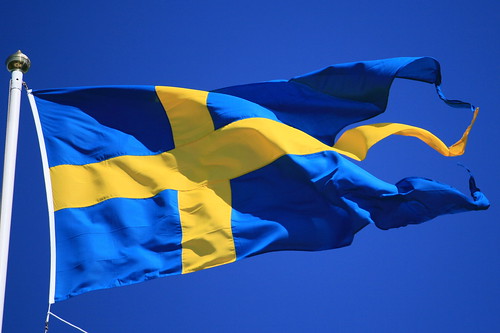
 The traditional word order in a nutshell: subject, verb, qualifier, object, how, where, when.
The traditional word order in a nutshell: subject, verb, qualifier, object, how, where, when.
 Sin, sitt and sina can only be used when the third person possessive adjective refers to the subject of the same clause. These words can be translated as his, her, its or their. Generally, if you cannot insert “own” after the possessive adjective in English, you cannot use sin/sitt/sina.
Per besöker sin mamma. = Per visits his (own) mother. (Sin refers back to Per.)
Eva ringer hans mamma. = Eva calls his mother. (Hans refers to Per, not Eva.)
Sin, sitt and sina can only be used when the third person possessive adjective refers to the subject of the same clause. These words can be translated as his, her, its or their. Generally, if you cannot insert “own” after the possessive adjective in English, you cannot use sin/sitt/sina.
Per besöker sin mamma. = Per visits his (own) mother. (Sin refers back to Per.)
Eva ringer hans mamma. = Eva calls his mother. (Hans refers to Per, not Eva.)

 Danish pronouns include personal pronouns (refer to the persons speaking, the persons spoken to, or the persons or things spoken about), indefinite pronouns, relative pronouns (connect parts of sentences) and reciprocal or reflexive pronouns (in which the object of a verb is being acted on by verb’s subject). Here are some examples:
Danish pronouns include personal pronouns (refer to the persons speaking, the persons spoken to, or the persons or things spoken about), indefinite pronouns, relative pronouns (connect parts of sentences) and reciprocal or reflexive pronouns (in which the object of a verb is being acted on by verb’s subject). Here are some examples:
 As you can see from the example above, the structure of the Pronouns in Danish has a logical pattern. Locate the Pronouns above and see how it works with the rest of the sentence in Dansk.
As you can see from the example above, the structure of the Pronouns in Danish has a logical pattern. Locate the Pronouns above and see how it works with the rest of the sentence in Dansk.
 Sin, sit and sine can only be used when the third person possessive adjective refers to the subject of the same clause. These words can be translated as his, her, its or their. Generally, if you cannot insert “own” after the possessive adjective in English, you cannot use sin/sit/sine.
Per besøger sin mor. = Per visits his (own) mother. (Sin refers back to Per.)
Eva ringer til hans mor. = Eva calls his mother. (Hans refers to Per, not Eva.)
Sin, sit and sine can only be used when the third person possessive adjective refers to the subject of the same clause. These words can be translated as his, her, its or their. Generally, if you cannot insert “own” after the possessive adjective in English, you cannot use sin/sit/sine.
Per besøger sin mor. = Per visits his (own) mother. (Sin refers back to Per.)
Eva ringer til hans mor. = Eva calls his mother. (Hans refers to Per, not Eva.)
 To make a sentence negative, simply add ikke after the verb. If there is a modal verb and a main verb (such as vil and an infinitive), ikke goes between these two verbs. In addition, if you answer “yes” to a negative question, you must use jo instead of ja.
To make a sentence negative, simply add ikke after the verb. If there is a modal verb and a main verb (such as vil and an infinitive), ikke goes between these two verbs. In addition, if you answer “yes” to a negative question, you must use jo instead of ja.








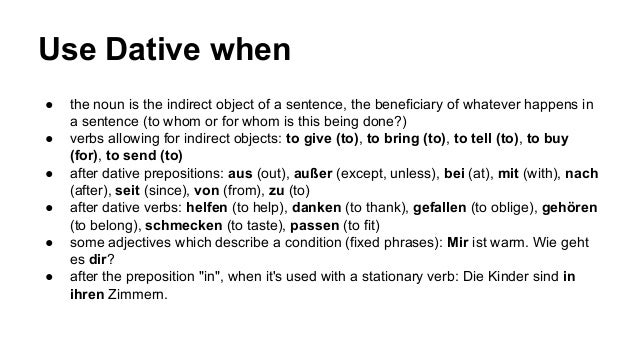



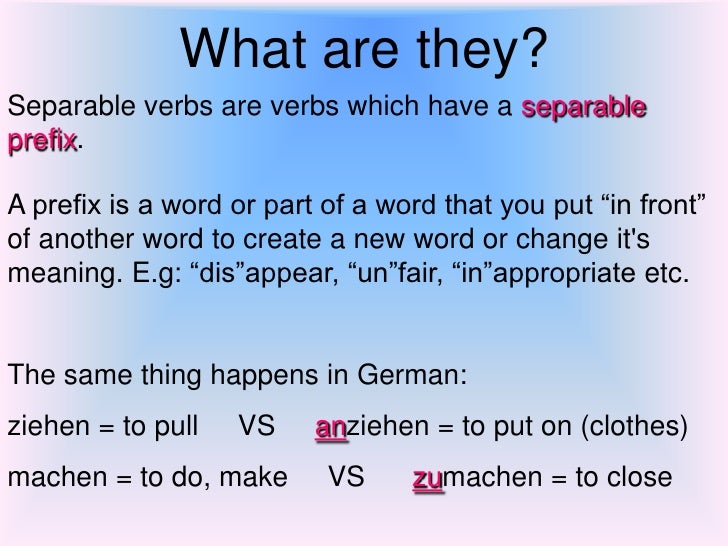




 In Italian, the present indicative tense works much like the present tense in English. To conjugate Italian verbs in the present indicative tense, you first need to understand that Italian infinitives (the “to” form, as in to die, to sleep, to dream) end in one of three ways — and that you conjugate the verb based on that ending:
In Italian, the present indicative tense works much like the present tense in English. To conjugate Italian verbs in the present indicative tense, you first need to understand that Italian infinitives (the “to” form, as in to die, to sleep, to dream) end in one of three ways — and that you conjugate the verb based on that ending:


 DIRECT OBJECT PRONOUNS
A direct object is the direct recipient of the action of a verb. Direct object pronouns replace direct object nouns. In Italian the forms of the direct object pronouns (i pronomi diretti) are as follows:
DIRECT OBJECT PRONOUNS
A direct object is the direct recipient of the action of a verb. Direct object pronouns replace direct object nouns. In Italian the forms of the direct object pronouns (i pronomi diretti) are as follows:
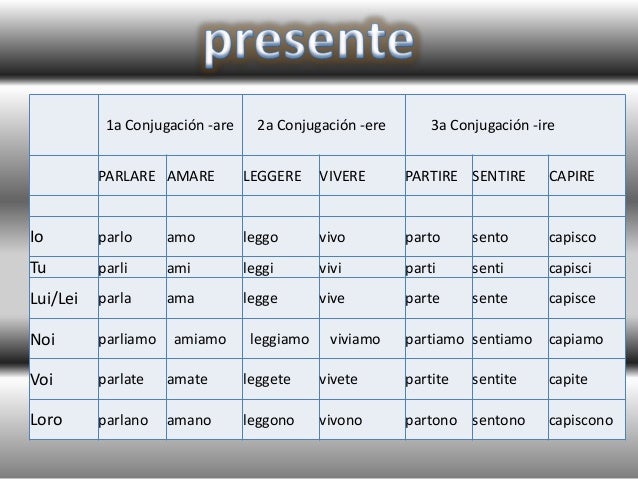 e verb or the auxiliary verb in the compound tenses. Examples:
e verb or the auxiliary verb in the compound tenses. Examples: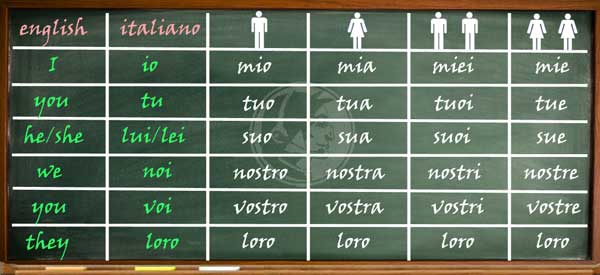





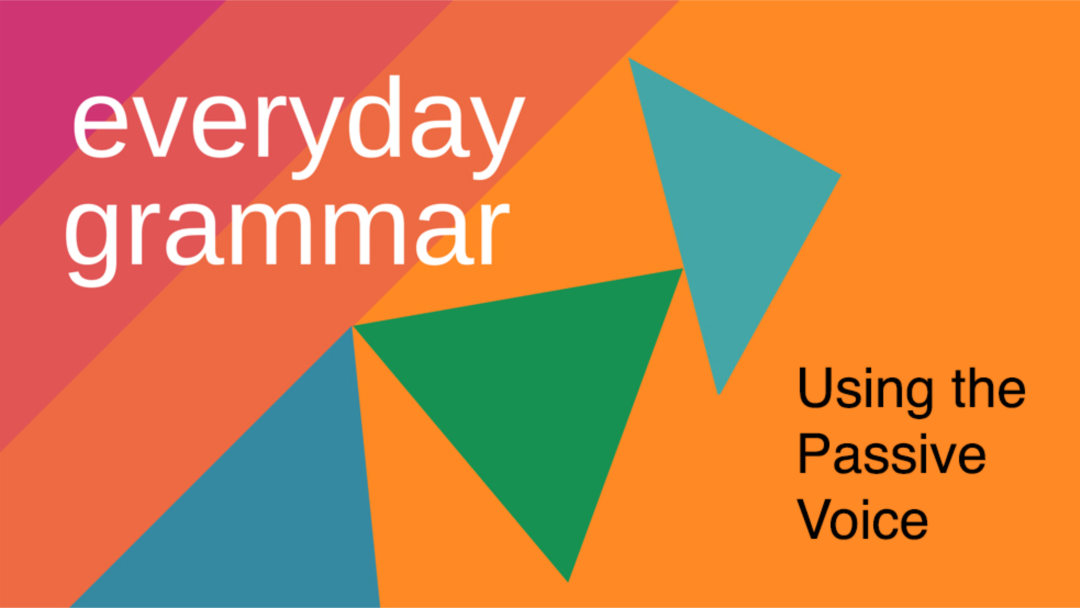




 This example combines two particles (doch and mal) and is a very commonly used phrase.
“Kanzlerin Merkel ist aber jeder Montag betrunken!” (But Chancellor Merkel is drunk every Monday!)
In this example, you’ll notice that the word aber, or “but,” is a lot more flexible than its direct English translation. It can be placed in the sentence differently and has more shades of meaning than the simple English “but.” Discover some of its other meanings below!
Halt, eben, einmal* (in this context, always unshortened) and nun einmal (shortened: nun mal) imply that the (often unpleasant) fact expressed in a sentence cannot be changed and must be accepted. Halt and nun mal are more colloquial than eben. In English, they could be rendered to “as a matter of fact” or by a “happen to” construction.
This example combines two particles (doch and mal) and is a very commonly used phrase.
“Kanzlerin Merkel ist aber jeder Montag betrunken!” (But Chancellor Merkel is drunk every Monday!)
In this example, you’ll notice that the word aber, or “but,” is a lot more flexible than its direct English translation. It can be placed in the sentence differently and has more shades of meaning than the simple English “but.” Discover some of its other meanings below!
Halt, eben, einmal* (in this context, always unshortened) and nun einmal (shortened: nun mal) imply that the (often unpleasant) fact expressed in a sentence cannot be changed and must be accepted. Halt and nun mal are more colloquial than eben. In English, they could be rendered to “as a matter of fact” or by a “happen to” construction.


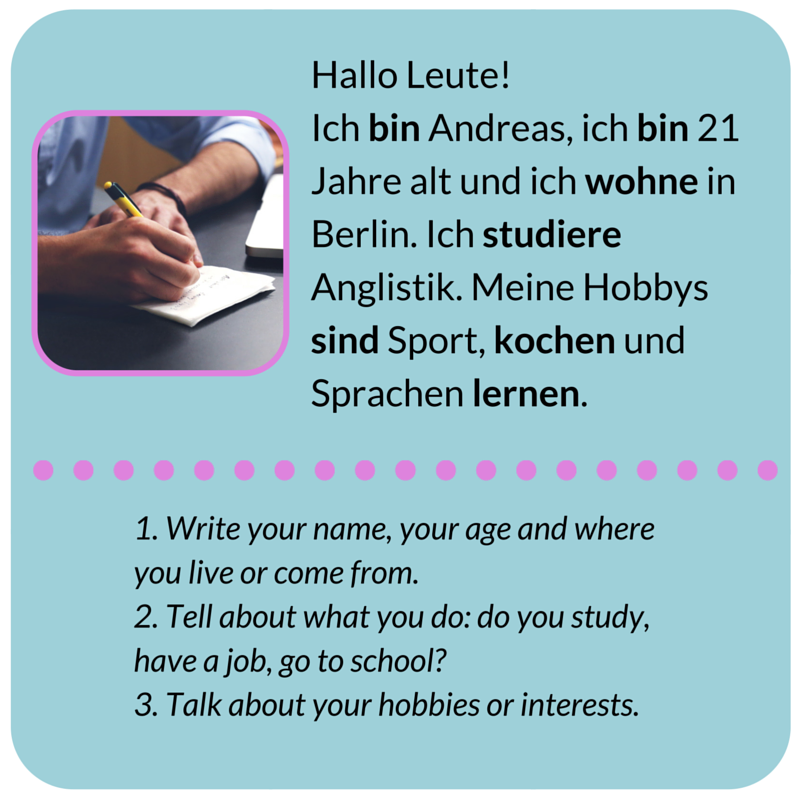 – Hi Guys! Hallo Leute!
– Oral Part – Start Deutsch 1 – Goethe Institut
– Hi Guys! Hallo Leute!
– Oral Part – Start Deutsch 1 – Goethe Institut
 – Ich komme aus Deutschland. Ich komme aus Indien. Ich komme aus Schweden. Ich komme aus
Frankreich.
– Die USA
– Ich komme aus den USA. Ich komme aus der Türkei. Ich komme aus der Schweiz.
– Ich arbeite als Sekretärin. Ich arbeite als Ärztin.
– Ich bin Arzt von Beruf. Ich bin Ingenieur von Beruf.
– Ich spreche…
– Ich spreche Deutsch und Englisch.
– Ich spreche Türkisch, Russisch und ein bisschen Deutsch
– Meine Hobbys sind Karate, Tanzen und Schwimmen.
– Ich schwimme gern. Ich tanze gern. Ich fahre gern Fahrrad.
– Meine Hobbys sind…
– Ich wohne in…
– Ich wohne in Berlin. Ich wohne in Madrid. Ich wohne in Chicago.
– Danke schön fürs Zusehen und bisc
– Ich komme aus Deutschland. Ich komme aus Indien. Ich komme aus Schweden. Ich komme aus
Frankreich.
– Die USA
– Ich komme aus den USA. Ich komme aus der Türkei. Ich komme aus der Schweiz.
– Ich arbeite als Sekretärin. Ich arbeite als Ärztin.
– Ich bin Arzt von Beruf. Ich bin Ingenieur von Beruf.
– Ich spreche…
– Ich spreche Deutsch und Englisch.
– Ich spreche Türkisch, Russisch und ein bisschen Deutsch
– Meine Hobbys sind Karate, Tanzen und Schwimmen.
– Ich schwimme gern. Ich tanze gern. Ich fahre gern Fahrrad.
– Meine Hobbys sind…
– Ich wohne in…
– Ich wohne in Berlin. Ich wohne in Madrid. Ich wohne in Chicago.
– Danke schön fürs Zusehen und bisc
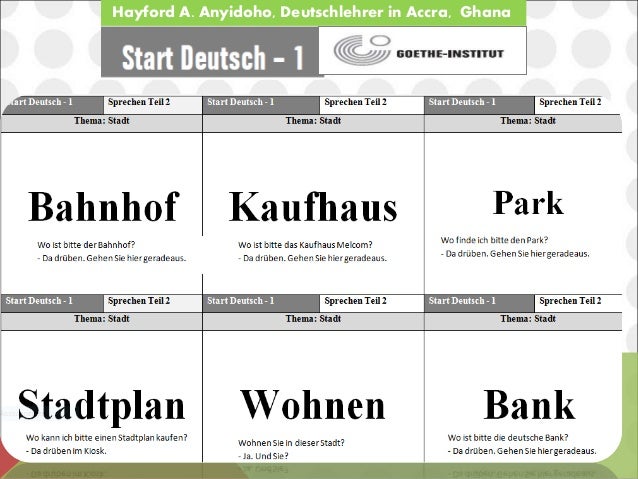
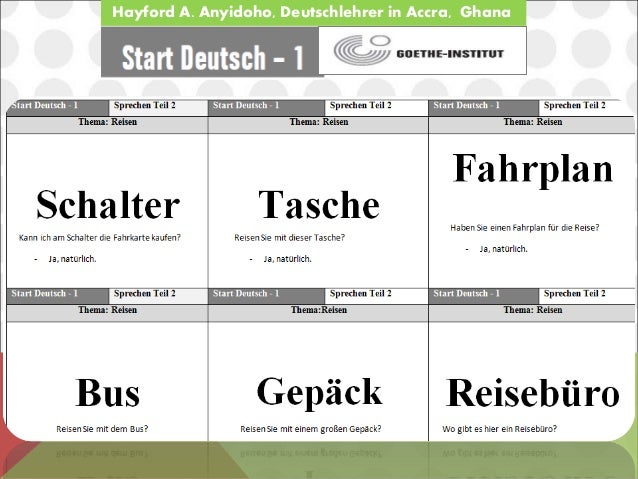


 ]]>
]]>